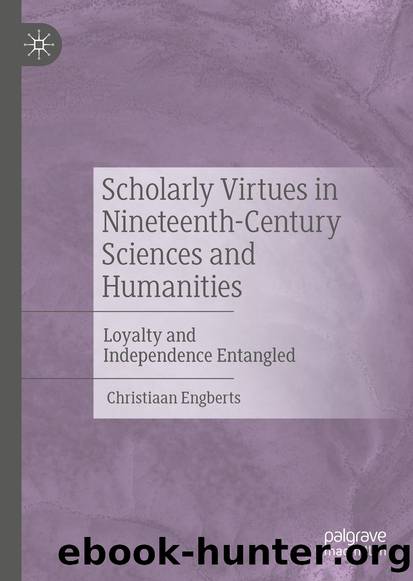Scholarly Virtues in Nineteenth-Century Sciences and Humanities by Christiaan Engberts

Author:Christiaan Engberts
Language: eng
Format: epub
ISBN: 9783030845667
Publisher: Springer International Publishing
Wundt on Religion and Nationality
The high number of Jewish scholars working in Semitic languages and Old Testament studies was quite exceptional. In the medical faculty and the non-linguistic disciplines in the philosophical faculty, the Jewish presence was more limited. Alexandra Pawliczekâs study of Jews appointed at the University of Berlin suggests that the Faculty of Law was most welcoming to Jews: more than a quarter of its staff was born in a Jewish family.65 Almost 10 percent of the students with a Jewish background who finished the Habilitation eventually reached the position of full professor. The number of people with Jewish roots was even higher at the Faculty of Medicine but only 3 percent of the Jews who finished their Habilitation there would eventually become full professors. Jewish career perspectives at the Faculty of Philosophy were even more limited, even if the high percentage of Jewish scholars in oriental studies is taken into account.
In a way, the lack of career perspectives for people with a Jewish background was more problematic for students of medicine than for orientalists. The orientalists could not only work as Privatdozenten in the periphery of the academic system, but they could also find employment at a variety of Jewish religious and educational institutions.66 The medical scholars reviewed by Wundt could not resort to such alternatives. They were even more dependent on university structures because physiological and anatomical research required workspaces, research materials, and tools that were only available at the well-endowed research institutes of German academia. At these places, Jews felt a strong pressure to convert to Christianity. Of all German professors with a Jewish background, only 13 percent had not been baptized.67 Therefore, most of the authors with a Jewish background whose work was reviewed by Wundt no longer identified as Jewish. Scholars like Julius Bernstein, Jacob Henle, and Rudolf Heidenhain had grown up in Jewish families but identified as Protestants. And because religious background is not as obviously relevant to medical research as it is to Old Testament studies, it is hardly surprising that there is no discernible aversion ofâor preference forâthe work of Jewish authors in Wundtâs reviews.
Similarly, there was no reason for Wundt to be particularly critical of the work of Catholic authors. A considerable part of the books by Catholic scholars that Wundt reviewed was written by Austrians and Viennese medical scholarship was held in high regard across Europe in the late nineteenth century. The renown of the Vienna Medical School can be traced back to the eighteenth century but reached new heights one century later in what has been called the new âGolden Age of medicine in Vienna.â68 The Vienna General Hospital led the way in pathological anatomy and clinicopathological studies.69 Physiology was well-represented by Ernst Brücke, a German protestant who was repeatedly praised by Wundt.70 In a review of a study of Sigmund Exner, Wundt acknowledges the exemplary character of Brückeâs institute, at which the author was employed.71 His review of the instituteâs leaderâs own Vorlesungen über Physiologie was
Download
This site does not store any files on its server. We only index and link to content provided by other sites. Please contact the content providers to delete copyright contents if any and email us, we'll remove relevant links or contents immediately.
| Africa | Americas |
| Arctic & Antarctica | Asia |
| Australia & Oceania | Europe |
| Middle East | Russia |
| United States | World |
| Ancient Civilizations | Military |
| Historical Study & Educational Resources |
Machine Learning at Scale with H2O by Gregory Keys | David Whiting(4292)
Never by Ken Follett(3937)
Fairy Tale by Stephen King(3370)
Oathbringer (The Stormlight Archive, Book 3) by Brandon Sanderson(3151)
The Man Who Died Twice by Richard Osman(3072)
Will by Will Smith(2907)
Rationality by Steven Pinker(2352)
Can't Hurt Me: Master Your Mind and Defy the Odds - Clean Edition by David Goggins(2322)
The Dark Hours by Michael Connelly(2300)
Friends, Lovers, and the Big Terrible Thing by Matthew Perry(2219)
The Dawn of Everything: A New History of Humanity by David Graeber & David Wengrow(2191)
Principles for Dealing With the Changing World Order: Why Nations Succeed and Fail by Ray Dalio(2036)
A Short History of War by Jeremy Black(1842)
HBR's 10 Must Reads 2022 by Harvard Business Review(1839)
Go Tell the Bees That I Am Gone by Diana Gabaldon(1748)
A Game of Thrones (The Illustrated Edition) by George R. R. Martin(1719)
Kingdom of Ash by Maas Sarah J(1667)
515945210 by Unknown(1660)
443319537 by Unknown(1544)
